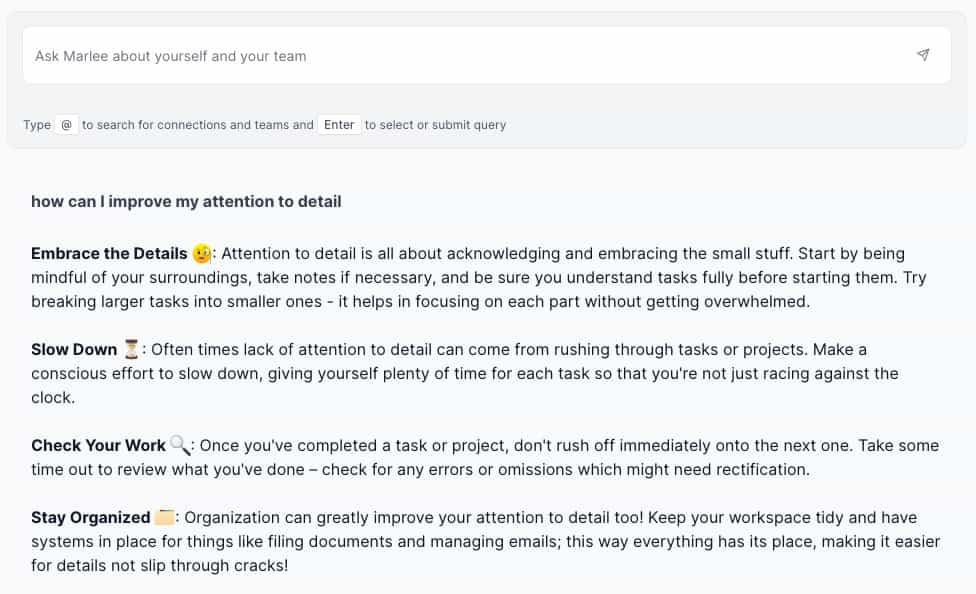What is attention to detail & how to develop it for success
Attention to detail is a critical skill that separates the exceptional from the ordinary. Whether you're an ambitious professional seeking career advancement or an organization striving for operational excellence, mastering this invaluable soft skill can be the key to unlocking new levels of success. In this comprehensive guide, we'll delve into attention to detail, exploring its definition, significance, and practical strategies to develop and showcase this essential skill.
What is attention to detail?
Attention to detail is the ability to observe, analyze, and comprehend even the most minute aspects of a task or situation. It is the art of being meticulous, precise, and thorough. This skill transcends beyond merely catching mistakes; it encompasses a commitment to excellence in every aspect of your work, from the initial planning stages to the final execution.
Why is it important to pay attention to detail?

Attention to detail is a highly sought-after skill that can significantly impact job performance, career advancement, and overall organizational success. Here are some compelling reasons why attention to detail is crucial in the workplace:
Ensuring accuracy and quality
Meticulous attention to detail allows you to produce consistent, high-quality work by minimizing errors and oversights, which can have far-reaching consequences across various industries.
Building trust and credibility
Demonstrating strong attention to detail showcases professionalism and a commitment to excellence, which can help you build trust and credibility with colleagues, managers, clients, and stakeholders.
Enhancing efficiency and productivity
By paying close attention to details, you can identify potential issues or bottlenecks early on, allowing you to address challenges quickly and streamline processes to improve efficiency and productivity.
Effective problem-solving and decision-making
Attention to detail enables you to gather and analyze information accurately, which is important for problem-solving and decision-making at work.
5 potential pitfalls for detail-oriented employees
While a keen eye for detail is an invaluable skill, it can also present challenges if not balanced properly. If you have a high attention to detail you may encounter the following pitfalls (which we prefer to call blind spots):
Tunnel vision
Hyper-focusing on minute details can cause you to lose sight of your objectives and strategic big picture.
Micromanagement perception
Dedication to perfecting every detail may lead others to view your approach as overly controlling or nitpicky.
Overwhelm and paralysis
When every aspect seems equally crucial, you may feel overwhelmed, struggling to prioritize and make progress.
Delayed initiation
The desire to have all information upfront may mean you delay project kickoffs until all details are finalized.
Endless refinement
Perfectionism can lead to a cycle of continuous revisions, making it challenging to complete tasks and move forward.
However, the advantages of exceptional attention to detail often outweigh these drawbacks in many roles. Plus, simply being aware of these blind spots can help you to navigate them.
6 telltale signs you're lacking attention to detail
A lack of attention to detail can lead to significant consequences in many industries and roles, impacting the quality of your work and overall success. If you suspect you may struggle with attention to detail, watch out for these telltale signs:
Frequent incomplete work submissions
Do you often forget to include attachments, overlook sections, or miss important elements when submitting work? Regularly submitting incomplete work is a clear sign that you're not paying close enough attention to details.
A constant need to fix mistakes
If your work regularly comes back to you with grammatical errors, omissions, or slip-ups that need patching, it's a sign that you're not scrutinizing your work thoroughly enough. High-quality results require a keen eye for detail.
Prioritizing speed over accuracy
While efficiency is admirable, constantly working at a breakneck pace can cause you to overlook finer points. If "fast" is the first word used to describe your work style, you may be sacrificing attention to detail for speed.
Lack of pride in previous work
Cringing at past projects because you now spot numerous mistakes or aspects you wish you'd done differently is a clear sign that you're not maintaining a close eye on details during the process.
Never the final reviewer
If your team consistently assigns the final review of shared projects to someone else, it could mean they don't trust your editing skills and ability to review all the details before finalizing the work.
Putting off intricate details
Responding to complex questions with "We'll worry about that later" indicates a tendency to overlook important details until it's necessary, which can lead to oversights and errors.
While lacking attention to detail may suggest a strength in big-picture thinking, it's essential to strike a balance. Recognizing these signs is the first step towards improving your ability to focus on details and produce high-quality, error-free work.
What are some examples of paying attention to detail?

Excellent attention to detail is an invaluable soft skill that can significantly elevate job performance and career development. It involves a meticulous approach, organizational prowess, and unwavering vigilance when tackling complex tasks. Attention to detail manifests itself in various ways, from painstakingly double-checking facts and figures in reports to catching subtle spelling errors in emails – all contributing to higher-quality work.
Organizational mastery
Organizational skills are a hallmark of those with a keen eye for detail. Well-organized professionals can prioritize tasks effectively, manage time efficiently, and meet deadlines with ease, ultimately boosting productivity and handling increased workloads.
Time management skills
Effective time management is inextricably linked to attention to detail. Individuals who excel in this area can prioritize tasks, meet deadlines, and achieve goals by avoiding procrastination, reducing stress, and optimizing productivity.
Analytical acumen
Attention to detail fuels strong analytical skills, enabling professionals to gather and interpret data accurately, identify patterns and trends, and think critically. These skills are particularly crucial in roles that demand robust problem-solving and decision-making abilities.
Observational skills
Paying close attention to details fosters exceptional observation skills, allowing individuals to analyze situations thoroughly and recognize patterns. These skills are invaluable for identifying problems, spotting opportunities, and developing effective solutions in the workplace.
Active listening
Demonstrating attention to detail extends to communication, where being an active listener comes into play. Offering your undivided attention, maintaining eye contact, understanding, and retaining information during conversations reduces misunderstandings and promotes seamless collaboration within teams.
How to improve your attention to detail: 6 tactics
Recognizing the need to sharpen your attention to detail is a crucial first step, but what tactics can you implement to develop this skill? Here are six strategies to help you hone your ability to focus on the finer points:
Take our attention to detail test
Answer our questions on what motivates you. We call it Depth, or your level of motivation for detailed information. Based on more than 20 years of evidence-based research and data, our revolutionary analytics have achieved more than 90% reliability in predicting personal and team motivations, behaviors, and performance.

Ask Marlee how to improve
Ask our AI Coach, Marlee any question, such as "How can I improve my attention to detail?" and receive personalized insights based on your motivations.

Set a goal and start AI Coaching
Once you've reviewed your results, you can set a goal and AI Coach Marlee will create a customized coaching program so you can start crushing your goals. Our online coaching programs coach to more than 1,000 different goals.
Embrace a mindful pace
Instead of treating your workday as a frantic sprint, consciously slow down and prioritize quality over quantity. Take deep breaths, incorporate frequent breaks, and truly consider the precision of your work. Time management techniques like the Pomodoro Technique can help you divide complex projects into manageable blocks, fostering better attention to detail.
Practice single-tasking
Multitasking is a productivity killer and a surefire way to overlook crucial details. Challenge yourself to focus on one task at a time, eliminating distractions like multiple browser tabs, email, and social media. Research consistently shows that task-switching leads to more mistakes and reduced attention spans.
Implement templates and checklists
If consistency is a challenge, leverage the power of templates and checklists to ensure you consistently address all necessary details for complicated tasks. Create canned email responses for frequent communications and develop task-specific templates with checklists to guarantee you don't overlook crucial elements.
Seek external feedback
Collaborative feedback can be invaluable, especially if you're still developing your eye for detail. After completing a task, ask a colleague or friend to review your work, providing fresh perspectives and catching any oversights you may have missed.
Break down large projects
Feeling overwhelmed can lead to overlooking details as you race to make progress. Combat this by breaking down extensive projects into smaller, more manageable components. This approach not only makes daunting tasks feel more approachable but also provides regular opportunities to reassess and refocus on specifics.
By implementing these tactics, you can develop greater attention to detail, ensuring precision and accuracy in your work and positioning yourself for professional growth and success.
Attention to detail interview questions: be prepared to answer these
When it comes to job interviews, potential employers are keen to determine if the "detail-oriented" skill listed on your resume is genuine or exaggerated. To assess your true capability for attention to detail, they'll be observing various aspects, including:
- Interview preparedness: How well you've researched the company, role, and job description, and prepared thoughtful questions, demonstrating your attention to critical details.
- Punctuality: Arriving on time showcases your respect for the interviewer's schedule.
- Thorough responses: The level of detail you provide in your answers, avoiding vague generalizations and instead offering specific, well-thought-out examples.
- Insightful questions: The types of questions you ask at the end reveal your curiosity about role nuances and attention to gathering detailed information.
Beyond these cues, interviewers will likely ask targeted questions to gauge your attention to detail levels, such as:
- Quality control processes: "What systems do you have in place to check your own work?" Detailing robust processes highlights your commitment to accuracy.
- Error identification: "Tell me about a time when you caught an error or problem." Recounting specific instances proves your ability to spot issues.
- High-precision projects: "Describe a project that required a high level of accuracy." Provide relevant examples that demonstrate your capacity for critical thinking and detail-oriented work.
- Project planning: "What are the first steps you take when starting a new project?" Outlining a thorough approach emphasizes your attention to crucial initial details.
Many of these are behavioral interview questions, beginning with "Tell me about..." Employers favor these as they move beyond platitudes, allowing you to provide real-life examples showcasing your skills in action.
The STAR method (Situation, Task, Action, Result) offers a valuable framework for comprehensively responding while maintaining focus:
- Situation: Describe the specific scenario.
- Task: Explain your role and responsibilities.
- Action: Detail the steps you took, emphasizing your attentiveness.
- Result: Quantify the positive outcomes achieved through your diligence when possible.
For example: "This happened while I was on the content team at CompanyXYZ (Situation). I was tasked with identifying our top traffic sources (Task). After meticulously analyzing our Google Analytics data, I discovered we had been misclassifying social ad traffic (Action). By updating the links, I clarified our sources, allowing us to better tailor our strategy and increase traffic by 15% (Result)."
With strategic preparation using the STAR method, you can highlight your attention to detail capabilities, providing interviewers with compelling evidence that you have this critical skill in spades.
How to describe your attention to detail on your resume
Attention to detail is essential in various industries and professions, where even the slightest oversight can have significant consequences. Here are a few examples and practical applications of attention to detail in the workplace, to include on your resume:
Finance and Accounting
Attention to detail is crucial in ensuring accurate financial records, reconciling accounts, and detecting errors or discrepancies that could lead to costly mistakes or compliance issues.
"I prepared detailed monthly financial reports, statements, and forecasts with precise data entry, ensuring accuracy in calculations and compliance with accounting principles."
Healthcare
In the medical field, attention to detail can literally save lives. From correctly interpreting diagnostic tests and administering medications to following precise surgical procedures, attention to detail is paramount for patient safety and quality care.
"I developed and implemented a double-checking system for high-risk medications, reducing medication errors by 35% on the unit."
Engineering and construction
Attention to detail is essential in ensuring the accuracy of blueprints, calculations, and specifications, as well as adherence to safety protocols and building codes, which can prevent costly errors and potential disasters.
"I identified and corrected a critical error in the foundation design for a high-rise project, preventing potential structural failures and saving the company an estimated US$500,000 in rework costs."
Legal profession
In the legal field, attention to detail is critical in drafting contracts, interpreting laws and regulations, and preparing legal documents, where even a minor oversight can have serious consequences for clients.
"I reviewed and analyzed contracts, statutes, and case law to identify relevant legal issues and precedents."
Customer service and sales
Demonstrating attention to detail in customer interactions, understanding their specific needs and preferences, and providing accurate and personalized solutions can lead to improved customer satisfaction and loyalty.
"I demonstrated in-depth knowledge of product features, specifications, and compatibility to assist customers in making informed purchasing decisions."
Attention to detail: The key to landing your dream job
Attention to detail is a powerful skill that can help you land your dream job and propel you toward achieving your professional goals. By understanding its definition, recognizing its importance in the workplace, and actively developing and demonstrating this valuable soft skill, you can advance your career in any organization.
Find out how you rank in attention to detail
Answer our questions on what motivates you and discover how you approach tasks. Are you a big-picture thinker or do you have attention to detail?
Recommended program for you:
Our expert coaches developed a program to help you hone your attention to detail. You'll develop a genuine appreciation for detailed thinking to execute your vision and measure performance, while accelerating your ability to learn and change.
Coach Marlee (your amazing AI-powered personal coach) will analyse your unique traits and goals to personalize the program so you see results as quickly as possible.
Testimonials

“I’ve always found it daunting to be a leader, I have never sought out to be the one in charge. The positions have always found me. I now have new confidence. I especially like the concept of leadership through context. Very empowering”.

“What profound and exciting coaching. Brilliant!”

“Personal power program was great for me to gain confidence and knowledge on approaching my new leadership role”

“The only way to move ahead is to work out the next action and then schedule a time to do it!”

"I have learned how to communicate better using every tool I have in myself, especially in learning how to use my tone of voice"

“What an awesome way to get better at collaborating with my teammates! Thumbs up Marlee!“

"With attention to detail program, I learned a whole new way to see and approach projects"

“I love how practical this coaching is!”
Related Articles
What’s your communication style?
Learn how to connect with colleagues and boost workplace motivation.

Name Surname
Position, Company name

Name Surname
Position, Company name

Name Surname
Position, Company name

Name Surname
Position, Company name

Name Surname
Position, Company name

Name Surname
Position, Company name
Your submission has been received!

Hack your wellbeing, productivity and goals
Programs are created by expert coaches & delivered by our incredible A.I. Coach Marlee. Sessions only take 5-15 minutes and are 100% personalized to fit your unique traits and goals.
